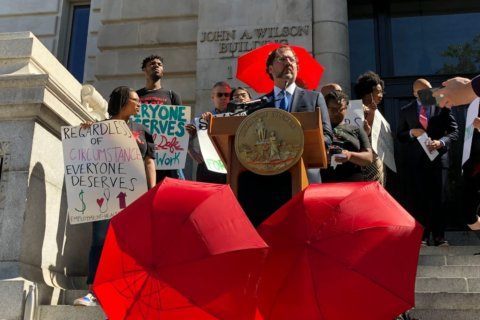D.C. leaders are considering legislation that would take criminal penalties off the table for those taking part in sex work in the District. But, in an emotional hearing at city hall Thursday, the majority of more than 180 witnesses vehemently opposed the decriminalization of buying and selling sex.
Felicia Henry with Courtney’s House, a D.C.-based resource for child victims of sexual exploitation, echoed the sentiments of dozens of witnesses before her in calling for a “no” vote on the Community Safety and Health Amendment Act of 2019.
The majority in the overflowing D.C. Council room opposed the bill to decriminalize sex work for those participating in sex work, including those who buy and sell sex.
“What we’re trying to do is try to find a way to make it so that people can actually find help when they need help, that they can report it to the police when they need to report it to the police,” said D.C. Council member David Grosso, I-At Large, of his legislation.
“Mr. Grosso wants the public to believe that pimping won’t increase under his proposal, but it seems he is out of touch about the alarming issue of sex trafficking in Washington, D.C.,” Henry said.
Concern over what decriminalizing buying and selling sex would mean to human trafficking in the District was a common concern among those who made their voices heard, from both residents and advocates representing nonprofit groups.
Yasmin Vafa with Rights for Girls suggested partial decriminalization and putting support programs in place for victimized people to get out of sex work.
“The true progressive solution is to work toward reducing the number of people involved by offering them services, housing and other vital support,” Vafa said. “But this bill does none of that.”
Grosso said, “The reason that we introduced it the way we did was because we are fearful that if we keep it criminalized on both sides, there will still be an underground market that will allow for the type of assaults and violence that is so experienced.”
For too long D.C. has used criminalization to address sex work, which has only harmed the most vulnerable while fostering violence & exploitation. Today, the Council holds a hearing on a new approach focused on human rights, health & safety: https://t.co/f9RMk75u2G #DecrimNowDC pic.twitter.com/xCTIs6NqO1
— David Grosso (@cmdgrosso) October 17, 2019
Vafa questioned why the city would declassify sex work as a crime, thereby making it a legitimate profession. “Indeed, if we are to accept that prostitution is a job like any other, why would we be investing in services to help people out of it? … Are we then prepared to deny poor women unemployment benefits for refusing a job at a brothel?” she said.
Throughout the hearing, both council members and witnesses referenced the Nordic model, which attempts to decriminalize sex workers while offering support to get out of the sex trade. However, it differs from the D.C. bill in that it doesn’t take away criminal penalties for those who buy sexual services.
“There is still a hesitance to actually engage with the government when one side is still illegal and the other is decriminalized, and that keeps it underground,” Grosso said.
His bill, in its current form, calls for the establishment of a task force to study and make recommendations on the “effects and unintended consequences of the Reducing Criminalization of Commercial Sex Amendment Act of 2019, additional changes to criminal penalties for commercial sex and supports for individuals engaging in commercial sex in the District of Columbia,” according to the bill summary.
“All of us at Covenant House are fully behind the decriminalizing of those selling sex. However, it is beyond comprehension why anyone would want to give pimps and buyers who exploit desperate young people a free pass and more incentive to profit off the most vulnerable among us,” said Jayne Bigelsen of Covenant House.
It’s unclear if the language of the bill will change based on the feedback during the daylong public hearing Thursday.
Council member Charles Allen, D-Ward 6, is a co-sponsor of the bill. Though there are laws prohibiting human trafficking and pandering in D.C., Allen said in the last two and a half years, there have only been five convictions for both crimes combined, which suggests that enforcement is an issue.






